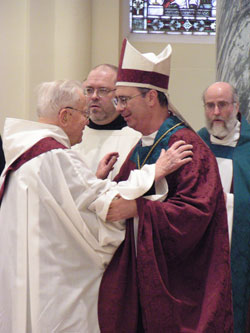Father Theodore Heck, 108, was world’s oldest Benedictine monk

Benedictine Father Theodore Heck gives the sign of peace to Benedictine Archabbot Justin DuVall during a Mass at the Archabbey Church of Our Lady of Einseideln on Jan. 21, 2005. During the liturgy, Archabbot Justin, who was elected the leader of Saint Meinrad Archabbey on Dec. 31, 2004, was ritually blessed and took office. Father Theodore died on April 29 at the age of 108. He was the oldest Benedictine monk in the world. (File photo by Sean Gallagher)
By Sean Gallagher
Benedictine Father Theodore Heck, a monk of Saint Meinrad Archabbey in St. Meinrad, died on April 29. He was 108, and was the world’s oldest Benedictine monk.
The Office of the Dead was prayed for him on May 1, and the Mass of Christian burial was celebrated on May 2 at the Archabbey Church of Our Lady of Einseideln. Burial followed at the Archabbey Cemetery.
Starting in 1935, Father Theodore spent half a century teaching and serving as an administrator of Saint Meinrad’s minor and major seminaries. He was rector of Saint Meinrad School of Theology from 1956-66 and served as rector of
Saint Meinrad College for three years during that span.
Archabbot Justin DuVall, the leader of Saint Meinrad Archabbey, praised him for his longstanding ministry in the seminary. He also said that Father Theodore showed what it meant to be a monk by his “fidelity to prayer” and by becoming a well-rounded person through constant reading.
Archabbot Justin also noted that Father Theodore, who came to Saint Meinrad in 1918 to its seminary, was a good source of its history.
“He was sort of the living memory of a good part of the history of this community,” Archabbot Justin said. “But not only that, he had a tremendous memory for keeping at least the facts straight of where the men were and what they were doing who were in school here while he was rector. He would keep up with them.”
Because of his decades of ministry in priestly formation at Saint Meinrad, he helped form a generation of priests of the Archdiocese of Indianapolis, including Archbishop Daniel M. Buechlein.
“Father Theodore was a quiet and unassuming monk and priest, and was a steady administrator,” said Archbishop Buechlein. “Everyone I know respected his integrity and unpretentiousness.”
Archabbot Justin said Father Theodore was modest throughout his life despite his accomplishments in priestly formation.
“Even in his later years, he was always the first to volunteer for the smallest things, whether that was stuffing envelopes in the development office or cleaning up around the house,” Archabbot Justin said. “It didn’t matter to him. Nothing was beneath him in that sense.”
Msgr. Harold Knueven, who spent 12 years in priestly formation at Saint Meinrad and was ordained a priest in 1958, praised Father Theodore for his kindness.
“He was a gentle, gentle man,” said Msgr. Knueven, administrator of St. Mary Parish in Greensburg. “He wouldn’t hurt a soul. He was very kind and compassionate, just a jewel.”
Father James Bonke, defender of the bond for the archdiocesan Metropolitan Tribunal and associate pastor of Christ the King Parish in Indianapolis, was a seminarian under Father Theodore from 1962-66.
He commended him for seeing the need for the seminary to be accredited like any other institution of higher education.
“He thought that if seminary education was going to be deemed credible that the schools needed to be accredited both by secular accrediting agencies as well as the proper ecclesiastical agencies,” Father Bonke said. “He saw that need and pursued it.
“Having come through Saint Meinrad, I think we respect a good education.”
Father Bonke said that Father Theodore provided steady leadership during the sometimes tumultuous years of Vatican II by “being a good monk and being faithful to the Church, which he was above all things.”
“I think his approach was that if this is what the Church wishes and intends and desires at this point in time, then that’s the way it should be,” Father Bonke said.
Father Theodore was born in Chariton, Iowa, on Jan. 16, 1901, to Henry Heck Sr. and Margaret (Steinbach) Heck. He received the name Henry John at baptism.
After attending elementary school in Missouri and three years of high school in West Terre Haute, Father Theodore enrolled in the minor seminary at Saint Meinrad in 1918. He entered the novitiate in 1922, professed simple vows on Sept. 8, 1923, and was ordained a priest on May 21, 1929. He would have celebrated his 80th anniversary as a priest this month.
After his ordination, Father Theodore taught in the minor seminary. In 1932, he began graduate studies at The Catholic University of America, earning a Ph.D. in education in 1935. He returned to Saint Meinrad and, for more than 50 years, taught in the minor and major seminaries, and held a variety of administrative positions in the Saint Meinrad schools.
Father Theodore also taught during the summers at the former St. Benedict College in Ferdinand, Ind., from 1936-43 and at the former Dubuque, Iowa, branch of The Catholic University of America from 1944-58.
For 17 years, he served as subprior (third in leadership) in the monastery and, for three years, as prior (second in leadership). He was a founding member of the American Benedictine Academy, serving as its first president from 1947-57.
At the age of 70, he began 17 years of pastoral service as vicar of St. John Chrysostom Parish in New Boston, Ind., in the Evansville Diocese. During these years, he continued to teach on the college faculty. When he retired, he was named emeritus professor of the college and pastor emeritus of St. John Chrysostom Parish. †
